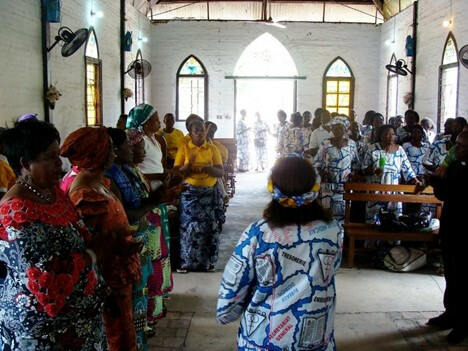
Presbyterian women in the Congo were prohibited from preaching in the church, but they could do it in their own gatherings. In 1990, the General Assembly (equivalent of the Methodist General Conference) agreed to set aside New Year’s Day for women or in the Tshiluba language “Dituku dia bamamu.” Since then, this day has become a very special day for families and friends. It is an exciting and enjoyable occasion for everybody.
In December, the women of each congregation get busy preparing for all activities (who will be the worship leader, who will lead hymns, who will be the preacher of the day, which food they will buy and fix to feed the whole congregation (worshippers), and who will oversee cooking, who will be the ushers…)
On New Year’s Day, people come to church with their guests. Women are happy about the new designs and beautiful fashion of the garments they wear. They call these fashions “Mukilisto Azali Muinda” in the Lingala language (which means “a Christian is the light” in English). During the worship service, some women lead the choirs, others lead praise songs and play drums, while others lead prayers and one preaches the sermon.
The most exciting moment of the service comes after the sermon. The leader comes in front to lead the praise songs for the people to give the offering. People line up to go to the front to put their money in the baskets. All the choirs join the congregation together by dancing and singing praise songs. In most cases, it takes a long time to end because some people have so much fun that they go around two or three times to put money in the baskets. The leaders don’t limit them because it is only a once-a-year event. When all the singing and dancing are done, the service concludes with some dramas. These dramas are based on the church or social matters. People draw important teachings from the dramas in simple ways.
When the service ends, people must be grouped in different seating arrangement according to their age and status in the church. Families and friends are separated from each to join others according to the organizer’s orders. The women who oversee cooking miss the worship service that morning because they must stay in the kitchen to cook for those who are at the church. At mealtime, they must serve all groups food and drink (usually fufu, goat meet, and orange juice). After people finish eating, those who prefer to leave are free to do so. Some who prefer to continue with the celebration stay for more activities.
New Years’ Day for women in the Congo has become an important day to bring families to celebrate together at church. In Tshiluba language, we call this day “Dituku dia Tshibilu” (A Day of Big Gathering). Who would want to stay home and miss being part of one big, exciting group which has the same desire to worship and have fun together? The General Assembly has noticed that the New Year’s ‘Day offering has increased to its highest point since the women have been put in charge of it. The gifts offered to church that day are used for the projects that benefit the wellbeing of the women in their community.
Mrs. Tshiebeji Batupu, a Congolese Presbyterian who has been in the United States for many years, says this about this New Year’s Day for women in the Congo: “I miss that day very much here in America. That was the busiest time in my life because I had to direct dramas, both at Christmas and New Year’s Day. Every time I go to church here in the United States, I feel sad and wish that I could have stayed home. I feel lonely and homesick. “
African immigrants are coming to this country for many reasons. They are working hard to be successful in this country and to make this their home. However, like Mrs. Tshiebeji, there are things they still miss the most from Africa.

